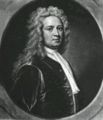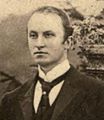The Spalding Gentlemen's Society is a learned society based in Spalding, Lincolnshire, England, concerned with cultural, scientific and antiquarian subjects. It is Britain's oldest such provincial body, founded in 1710 by Maurice Johnson (1688–1755) of Ayscoughfee Hall. Membership is open to anyone aged 18 or over: the term "gentlemen" in the title is historical – there is no discrimination between men and women. Its Grade II listed museum in Broad Street, Spalding, was designed by Joseph Boothroyd Corby and opened in 1911; additions to the building ensued in 1925 and 1960. The carved outside panels were by Jules Tuerlinckx of Malines, a Belgian refugee in the First World War, and likely a grandson of Flemish sculptor Joseph Tuerlinckx.
History


The Spalding Gentlemen's Society started in 1710 with informal meetings of a few gentlemen at a local coffee house in Spalding called Youngers. Many gentlemen's clubs formed in this way around that time. They talked about local antiquities and discussed the popular London newspaper The Tatler. In 1712 the society was organised in a more formal way as a Society of Gentlemen, for the supporting of mutual benevolence, and their improvement in the liberal sciences and in polite learning. Officers were appointed and minutes were kept. Francis Scott, 2nd Duke of Buccleuch (1695–1751), became Patron in 1732.
Records of the society's earliest activities have been published by the Lincoln Record Society as The Correspondence of the Spalding Gentlemen's Society, 1710–1761 and Minute-Books of The Spalding Gentlemen's Society, 1712–1755. Later works appear in catalogues as produced by "Spalding Gentleman's Society" in 1892 and 1893.
Notable members
Noteworthy and early members of the "Gentlemen's Society at Spalding" include:
- Sir Isaac Newton. Stukeley's unpublished memoir of Newton mentions his joining the society, and making a substantial donation of books.
- Ayuba Suleiman Diallo, freed slave, Muslim cleric and aristocrat from Senegal
- Dr William Stukeley, cleric and antiquary
- Sir Hans Sloane, President of the Royal Society, whose museum and library formed the nucleus of the British Museum
- "Honest Tom" Martin, antiquary
- Alexander Pope, poet
- Alexander Gordon, antiquary
- Sir Joseph Banks, naturalist and botanist
- Emanuel Mendes da Costa, botanist and conchologist
- Sir George Gilbert Scott, Gothic revival architect
- Alfred, Lord Tennyson, Poet Laureate
- George Vertue, engraver
- Joseph Ayloffe, antiquary
- John Anstis, F.R.S. Garter King of Arms
- John Gay, the poet
- Rev. Richard Bentley, D.D., classical scholar
- Captain John Perry, engineer
- Pishey Thompson, historian of Boston
- Andrew Michael Ramsay, Scottish writer
- Lord Curzon of Kedleston
- Lord Peckover, Quaker banker and philanthropist of Wisbech
- Lord Ancaster, the Society's Patron from 1960 to 1983
- Francis Bellinger, LRCP, (d. 1721), English physician
Gallery
-
 Isaac Newton
Isaac Newton
-
 William Stukeley
William Stukeley
-
 Joseph Banks
Joseph Banks
-
 Alfred, Lord Tennyson
Alfred, Lord Tennyson
-
 Alexander Pope
Alexander Pope
-
 Alexander Gordon
Alexander Gordon
-
 George Vertue
George Vertue
-
 John Anstis
John Anstis
-
 John Gay
John Gay
-
 Richard Bentley
Richard Bentley
-
 Lord Curzon
Lord Curzon
References
- "The Museum Building". Spalding Gentlemen's Society. Retrieved 9 July 2020.
- Historic England. "The Museum of the Spalding Gentlemens' Society, Broad Street (Grade II) (1147350)". National Heritage List for England.
- "1710 – Spalding – Spalding Gentlemen's Society". History of Scholarly Societies. University of Waterloo. Retrieved 28 November 2010.
- Stukeley, William (2010). Rob Iliffe; Scott Mandelbrote (eds.). Memoirs of Sir Isaac Newton's life. William Stukeley 1752 (AHRC Newton Papers Project: transcript ed.). University of Sussex: The Newton Project. pp. Source: Ms. 142, The Royal Society Library, London.
- Brown, Iain Gordon. "Gordon, Alexander". Oxford Dictionary of National Biography (online ed.). Oxford University Press. doi:10.1093/ref:odnb/11021. (Subscription or UK public library membership required.)
- "Ayloffe, Joseph" . Dictionary of National Biography. London: Smith, Elder & Co. 1885–1900.
Further reading
- Honeybone, Diana; Honeybone, Michael; Chisholm, Michael (2019). Against the Odds: the survival of the Spalding Gentlemen's Society. Spalding: Spalding Gentlemen's Society. ISBN 9781907730740.
- Owen, Dorothy M.; Woodward, S. W., eds. (1981). The Minute-Books of The Spalding Gentlemen's Society, 1712–1755. Lincoln Record Society. Vol. 73. Fakenham.
{{cite book}}: CS1 maint: location missing publisher (link) - Honeybone, D.; Honeybone, M., eds. (2010). The Correspondence of the Spalding Gentlemen's Society, 1710–1761. Lincoln Record Society. Vol. 99. Woodbridge: Boydell. ISBN 9780901503879.
External links
- Official website
- "Spalding Gentlemen's Society, registered charity no. 216131". Charity Commission for England and Wales.
- The Gentlemen's Society at Spalding: its origin and progress (1851) Bound with a catalogue of the society's library, 1893
- 1710 establishments in England
- Scientific organizations established in 1710
- Clubs and societies in England
- Culture in Lincolnshire
- History of Lincolnshire
- Regional and local learned societies of the United Kingdom
- Science and technology in Lincolnshire
- Spalding, Lincolnshire
- Organisations based in Lincolnshire
- Scientific societies based in the United Kingdom
- Museums in Lincolnshire